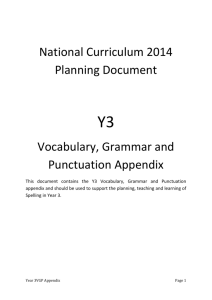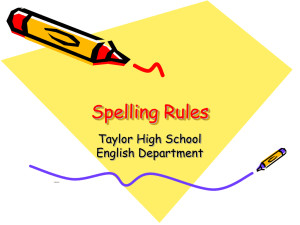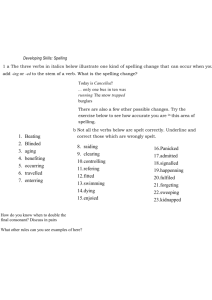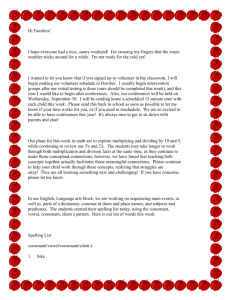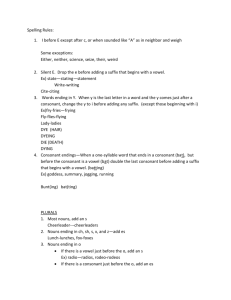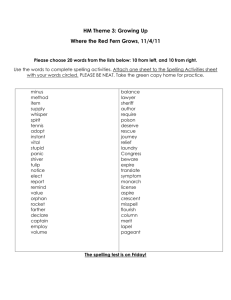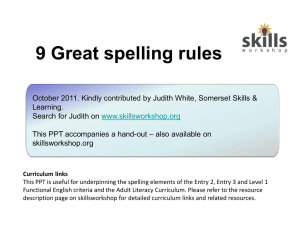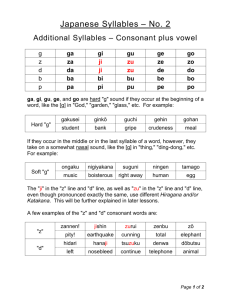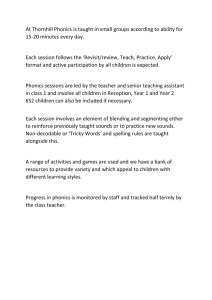File - NealeWEnglish
advertisement
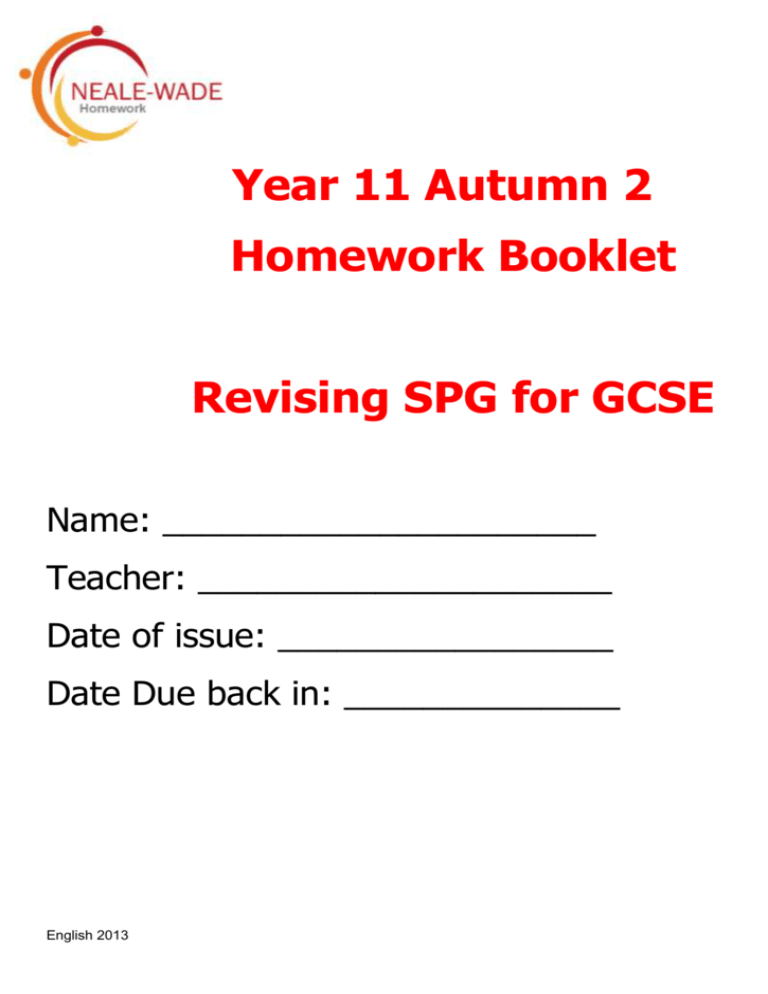
Year 11 Autumn 2 Homework Booklet Revising SPG for GCSE Name: ______________________ Teacher: _____________________ Date of issue: _________________ Date Due back in: ______________ English 2013 WEEK 1 1. q is always qu, It never stands by itself. 2. No English word ends in v except spiv. 3. No English word ends in j. 4. We double l, f, s after a single vowel at the end of a short word. e.g. call, tell, toss, miss, stiff, stuff. Exceptions: us, bus, gas, if, of, this, yes, plus, nil, pal. 5. The i or ee sound at the end of a word is nearly always y. No English word ends in i. Exceptions: [macaroni, spaghetti, vermicelli] (Italian), taxi (short for taxicab), coffee, committee. 6. Regular plurals are made by adding s. e.g. dogs, horses, monkeys, cliffs. 7. To form plurals of words with a hissing ending, add es. i.e. after s, x, z, sh, ch, ss e.g. buses, foxes, buzzes, wishes, churches, misses TASK 1: Read the spelling rules and then design an eye-catching poster using the information WEEK 2 8. All followed by another syllable only has one l. e.g. also, already, always, although. 9. Drop the final e from a root word before adding an ending beginning with a vowel, but keep it before a consonant e.g. [love, loving, lovely], [drive, driving, driver], [rattle, rattled, rattling] 10. ck, dge, tch may only be used after a short vowel. Exceptions: much, such, rich, which. 11. Words ending in both a single vowel and a single consonant always double the last consonant before adding an ending beginning with a vowel. e.g. [stop, stopped, stopping], [flat, flatter, flattest], [swim, swimmer, swimming] 12. Nouns ending in a single f change f to v before adding es to form the plural. e.g. [leaf, leaves], [wolf, wolves]. Exceptions: dwarfs, roofs, chiefs 13. If a word ends in a consonant plus y, change the y to i before adding any ending except ing. e.g. [party, parties], [heavy, heaviness], [marry, married], [funny, funnily] but: [cry, crying], [hurry, hurrying] TASK 2: Read the spelling rules and then compose a passage of descriptive writing which uses all3the words in bold. Week English 2012 2 WEEK 3 1. When c is followed by e, i or y it says s. Otherwise it says k. e.g. Says s: centre, ceiling, circle, cycle cf. Says k: cottage, cave, cream, curious, clever 2. When g is followed by e, i or y it says j. Otherwise it says g as in gold. e.g. Says j: gentle, giant, gymnastic cf Says g: gallon, guide, glass, grow Exceptions: get, begin, girl, give, gear, geese, gift, girth 3. Words ending in an o preceded by a consonant usually add es to form the plural. e.g. potato-es, volcano-es, torpedo-es Exceptions: pianos, solos, Eskimos. 4. i comes before e when it is pronounced ee, except when it follows c or when sounded like ay as in neighbour and weigh e.g. brief, field, priest, receive, deceive, ceiling. 5. ti, ci, si are three spellings most frequently used to say sh at the beginning of all syllables except the first. e.g. [national, patient, palatial, infectious], [gracious, ancient, musician, financial], [session, admission, mansion, division]. 6. Words ending in a single l after a single vowel, double the l before adding a suffix regardless of accent. e.g. cancelled, traveller, signalling, metallic. 7. If a word of more than one syllable ends in a t, preceded by a single vowel, and has the ACCENT on the last syllable, double the final consonant. e.g. [permit, permitted], [admit, admitted], [regret, regretted]. but: [visit, visited], [benefit, benefited] do not double t. TASK 3: Read the spelling rules and then write a write a speech entitled: Is spelling still important in 2013? Argue the case for or against the importance of spelling. Try to use lots of persuasive techniques in your speech. Aim to write around 300-400 words. English 2012 3 WEEK 4 – Playing the Teacher! The following story has been left without any punctuation or capitalisation. Read it carefully and insert capital letters, commas, full stops, question marks, exclamation marks, speech marks, colons, semicolons and apostrophes to help it read easily and make full sense. Correct the passage using a coloured pen. Use the school SPaG code in the margins. At the end, add www/ebi comments. it was one evening early in july 2009 when it happened rain was falling the sky was a deep purple -grey colour never before had I witnessed anything like it in fact never before had anyone living on earth witnessed anything like it the asteroid at first appeared as a small glowing white speck in the sky slowly and slowly it grew until it was the size and brightness of the sun itself the sky seemed to darken almost to a pure blackness which made the asteroid appear even larger and brighter than it really was it disappeared over the horizon with a loud whoosh followed by a crash all power everywhere was cut off darkness envelop ed the city as all lights were extinguished the ground shook and rumbled so violently that everyone was convinced the end had finally come a crazed man who was nearby cried out nostradamus nostradamus its the prophecy its the end of the world its the apocalypse people kneeled and many prayed yet as the minutes went by everything slowly returned to normal except we learned later that scotland or what was left of it could now only be reached across thirty kilometres of north sea independence for scotland eh WWW: EBI: English 2012 4 WEEK 5 - 1. Addressing individuals by name or title (‘Vocative’) When you write a sentence in which you (or a speaker) is talking to someone, and you call that person by his/her name or any sort of title, you must surround that name/title by commas. If the name/title comes at the beginning or end of the sentence, only one comma is used, of course. Excuse me, David, but your shoelace is undone. Mrs Smith, may I go to the toilet? Have you had a nice day, darling? Two or more names connected by ‘and’ count as a single form of address: Debra and Zoe, where do you think you’re going? Exercise: Rewrite these sentences in the space underneath, using commas to separate the names/titles. a. Have you done your homework Sally? b. Please sir is it the end of the lesson yet? c. Christina take that chewing gum out of your mouth. d. Go away you stupid girl. e. Dear friends we are gathered here today to witness the marriage of Edward and Rebecca. f. No dear you can’t have a Nintendo Game Cube. g. Marie could you make Dad a cup of tea? h. Sit down 7.6. i. You little monster what have you broken now? j. If you only knew Sophia how that boy treated me! English 2012 5 WEEK 6 - Separating a non-essential phrase from the main clause The ‘main clause’ is the part of the sentence which makes sense even if everything else was cut out of the sentence. Well, I’m not going to go to school unless I can get some new shoes. Here, the underlined section would make sense by itself; the italicised words depend on the main clause. Well is a non-essential word, because it adds nothing to the meaning of the sentence, though it may add to the emotion being expressed. The comma is used to separate these words/phrases, whether at the beginning, middle or end of the sentence. You know, he’s not very bright sometimes. I’m going home at 4 o’clock, I think. No, I don’t think so. You’re going, I hope, to do your practice. Exercise Write out these sentences, in the space underneath, using commas to separate the non-essential words and phrases. a. Honestly children these days are so silly. e. I can’t I’m afraid come to your party. b. You’re going tomorrow I hope. f. c. Yes you can come to the cinema. g. I shan’t be wanting any more thank you. d. Yvonne’s not I think one of your friends. h. Commas are tricky don’t you think? Go away please Adverbs and adverbials (an ‘adverbial’ is a phrase which acts like an adverb) which can be removed from the main clause without affecting the sense are treated in the same way, as are ‘interrogative’ phrases like ‘isn’t it?’, ‘won’t they?’ and ‘haven’t you?’ Hopefully, we’ll get there in time. Sadly, she died before the doctor arrived. Nevertheless, you’ve got to try again. She’s a nice girl, isn’t she? English 2012 She found her purse, luckily. He couldn’t, unfortunately, find the house. However, it’s a good thing in the long run. They’re starting a new school, aren’t they? 6 Exercise Write out these sentences, in the space underneath, using commas to separate the adverbs/adverbials and interrogative phrases. a. What’s more I passed the exam! g. All the same it’s bad news. b. You should of course read newspapers. h. Nonetheless you ought to pay him. c. She won’t wake up will she? i. You’re going to sit still aren’t you? d. I’ll be there in ten minutes hopefully. j. On the whole it’s a good thing. e. You however are another matter. k. Really you oughtn’t to have done that. f. He’s going away isn’t he? l. My aunt talks well doesn’t she? Now for the tricky bit. An adverb which affects the verb directly (and which will often come next to or near the verb) does NOT need to be separated by commas. Look at the difference between these pairs of sentences: Hopefully, we’ll get there in time. You never know, really. But But Sadly, she died before the doctor arrived. But Actually, it’s all for the best. But She looked hopefully at her father You really never know. She sadly read the letter. It’s actually worked this time! Exercise Write out these sentences, punctuating them fully. a. Well I think that it’s very unfair of your mother don’t you Sandra? b. She’s got an absolutely fantastic bike you know c. Actually we can’t really go there till Tuesday. d. Quite honestly I don’t know what you’re talking about. e. She owned up honestly that she’d taken the money at least. English 2012 7 f. At least she owned up that she’d taken the money. g. Nevertheless boys it is a disappointment isn’t it? h. I don’t know about you Charlotte but I’m definitely going to stay. i. After all it isn’t too terrible surely. j. Now really you mustn’t keep making a fuss Eleanor. k. She sobbed tragically all through dinner you remember. l. Tragically the dog died didn’t it? m. Mum I’ve got twelve pounds more or less. n. Don’t eat your dinner so greedily Janet. o. It’s a terrible responsibility I’m afraid isn’t it? English 2012 8 English Assessment What went well…?: Even better if…?: What I think…? GRADE: EXCELLENT GOOD SATISFACTORY POOR Teacher Comment: English 2012 9 Parent’s Log Week English 2012 Questions or comments Signature 10 English 2012 11

